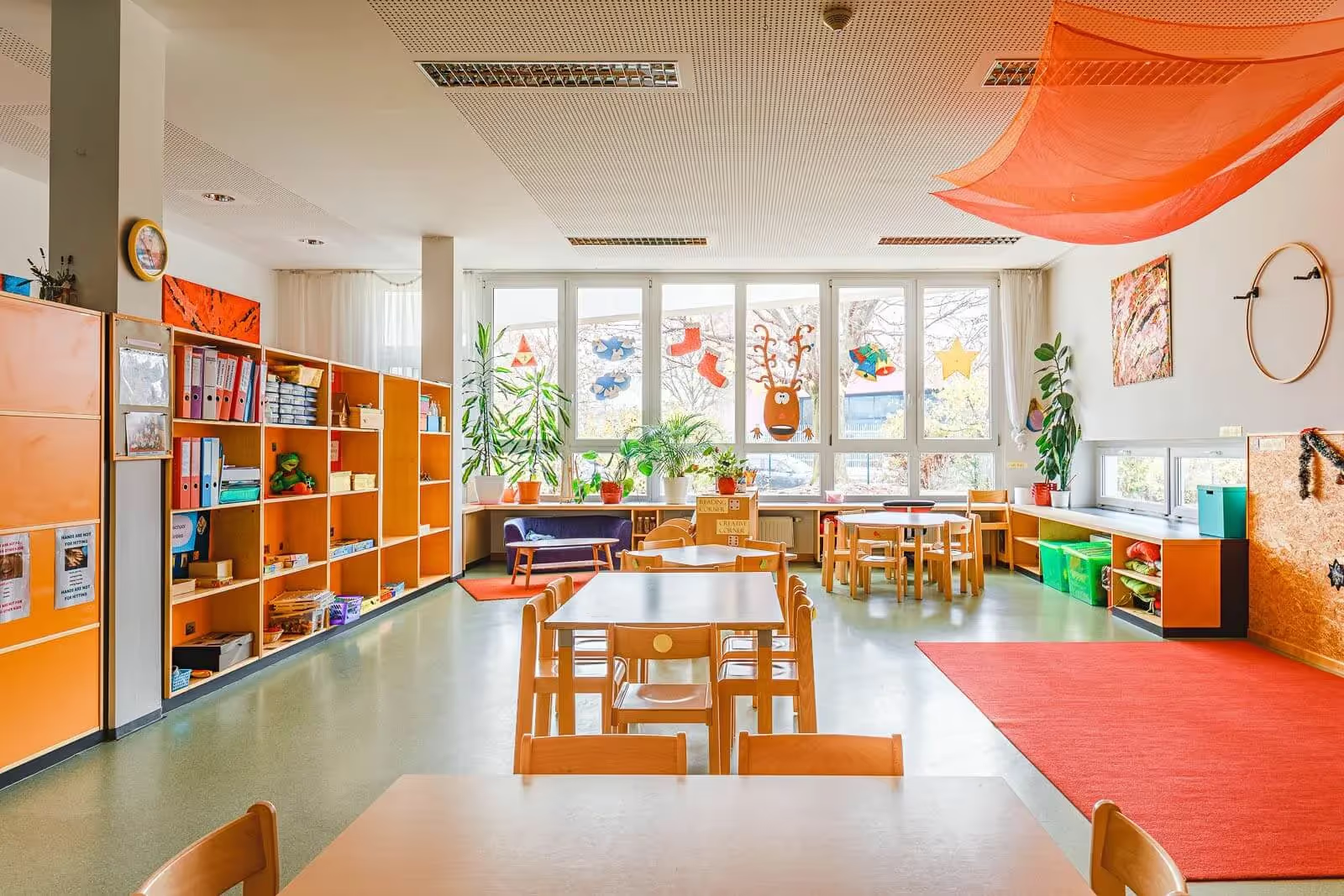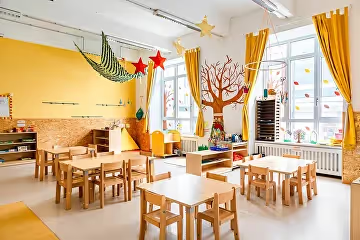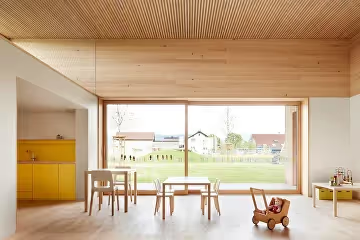Kindergartens in Austria
Kindergartens in Austria – what are they, when to send your child to kindergarten, the cost of communication, what documents are needed to enroll in kindergarten? Top 3 kindergartens in Vienna.

Austria is famed for its high quality of life and education, and kindergartens have long been pedagogically valuable institutions, where children develop their personality and social skills.
At the same time, however, preschools in Austria have their own peculiarities and it is not always easy to work out how they differ, which options to consider, how the nursery and kindergarten system is organised, and what to look out for.
In this article, we will take a look at the structure of the pre-school system in Austria, whether there are any special requirements, how to apply to kindergartens, and what factors are essential to take into account in order to choose the most suitable option for your child.
IMPORTANT: Luxury Immobilien GmbH only provides services for buying, renting and selling real estate in Vienna and other federal states of Austria. You can also get legal advice concerning investments in Austrian real estate, starting a business or obtaining a residence permit.
*ALL THE FOLLOWING INFORMATION IS FOR INFORMATION PURPOSES ONLY.
Types of childcare facilities

The decision as to whether or not to send a child to a nursery school depends on the possibilities and wishes of the parents in Austria. However, it is different for kindergartens. According to the municipal ordinances of all federal states of Austria, children from the age of 5 must be taught in kindergarten preparatory groups. Kindergarten has to be attended for at least 20 hours 5 days a week. This year is considered active preparation for school.
Approximately 60% of kindergartens in Austria are public, whereas the remaining 40% are operated by family and charitable organisations, parishes, companies and private individuals. Below we will take a look at the main types of kindergartens.
Public Kindergartens
In Austria, public kindergartens are state-subsidised, so attendance is completely free. However, you may have to pay for food for your children - usually around EUR 60 per month. Public kindergarten classes are intended for children aged 3 to 6 and consist of a maximum of 25 children and 1 kindergarten teacher. Many kindergartens are open from 7am to 6pm. This makes them very attractive, particularly for busy parents. Enrolment is not affected by the nationality of the child or the religion of the parents. It is easy to get a place if you have a residence permit or a student visa.
NBD! If you encounter difficulties in applying for a residence permit in Austria, our team at Luxury Immobilien GmbH can provide you with professional legal services to assist you with the procedure of obtaining one and purchasing/leasing real estate.
Non-Commercial Kindergartens
Commercial kindergarten is slightly more expensive than a public kindergarten, but still considered budget-friendly. That being said, its cost averages at EUR 250 per month as the state partially covers the fees. There is a maximum of 7 children per class. You can also choose from three types of private kindergartens: German, bilingual or religious.
Parental kindergarten is a parent-run daycare center that has 2-3 staff members and around 15 children at a time. Usually the staff members are parents of some of the children in the class. Therefore, the staff are more involved in cooking, cleaning and administration. Parents also have more say in their child's education than in a private kindergarten. The cost is around EUR 100 per month.
Corporate daycare is run by companies for their employees. Sometimes, children of non-working individuals may also be taken if space allows.
Private day nursery is an option for children up to the age of 3 years old in Austria. Classes in groups (15-30 people) start in September. Working hours are from 6.30am to 5.30pm. Breakfast, lunch and an afternoon snack are fixed items in the daily routine. The education, play programmes and the afternoon nap times vary from facility to facility.
Day parents (Tageseltern), or in other words "nannies", have become very popular, since it is not always easy to get a place in a daycare center. It doesn’t matter what kind of training or experience you have and these nannies are very much in demand. They are not only childminders but also helpers and teachers for children at home. Qualified nannies can be found through the child and youth welfare office; Jugendamt or recruitment agencies for domestic staff.

NBD! If you are planning a move to Austria and have not yet decided on the area and type of property you prefer, it is advisable to study the price trends of Austrian property in 2022 beforehand. In this article, you can find out the current buying and rental price tendencies, as well as the key factors affecting the market fluctuations.
Private institutions may offer music, dance and language tuition as part of their curriculum, however public kindergartens do not provide this. The basics of reading and writing are not taught in kindergartens, as teaching these skills is taken over by parents. There are however, special groups for foreigners, where children are introduced to German in a playful way. Entertainment activities for children are more varied in private establishments than in public kindergartens in Austria. Children often go to the swimming pool and attend dancing and skiing classes.
Among the many undeniable perks of Austrian nurseries and kindergartens is the stability of the teaching staff. The same caregiver and assistant usually attend to the children the whole time they are in nursery school or kindergarten.
It is also worth mentioning the Vienna campuses, which combine school, daycare and leisure time facilities under one roof. This means that parents and children don't have to spend time travelling from kindergarten to a gymnasium or music school.
The official religion in Austria is Catholicism, and as a result many kindergartens and schools are under the patronage of the Catholic Church. This means that the kindergarten will sing Catholic prayers and celebrate holidays dedicated to the saints of that religion and more. You do not have to be catholic to enroll in this type of kindergarten, but you have to be prepared to accept these conditions, or to look for non-catholic kindergartens from the very start.

Operating Hours of Kindergartens
Full-time: 6.30am to 5.30pm (also possible from 6am to 6 or 8pm).
Part-time - morning: 6.30am to 2.00pm (6am to 6pm or 8pm is also possible).
Part-time - afternoon: from 12pm to 5.30pm (also possible until 6pm or 8 pm).
Half-day - morning: 8am to 12 pm.
Half-day - afternoon: from 1pm to 5pm.
NBD! To find out about the school system in Austria, costs and requirements for enrolment, as well as the best schools in Vienna, please read this article.
Registration procedure for kindergarten

It is advisable to apply for a place at the nursery or kindergarten as early as possible - at least 8 to 9 months before the beginning of the school year - because these institutions are generally short-staffed.
Before registering a child, parents have to apply for a Kindernummer (child identification number) at the municipality of residence. In Vienna, for example, the registration of children is handled by the city administration's municipal department No. 10. The registration form can be filled out on site or online.
In order to register you will need the following papers:
- Parents' passports
- Birth certificate
- Meldezettel registration card
- Child's national insurance number
The number is issued free of charge. There is no exact deadline for its issuance. In Vienna, for example, registration begins in November-December and applications are made as early as January-February.
The documents found below are required for registration at a daycare center:
- Child's number (Kindersnummer)
- Proof of the registration of the parents and child
- Child's social insurance number (E-Card)
- E-card of the parents or legal guardians
- Vaccination certificate
- Bank statement showing the amount of the parental contribution deducted
- Account number of the Single European Payment Area (SEPA) for charging the daycare fee.
NBD! If you are a guardian, you will also need proof of a court order to care for your child and a reference from your employer stating your position.

Priority for enrolment in a daycare center:
- Working parents
- If the child's siblings attend the institution
- Parents' employment history at the time of enrolment
- How close the child lives to the daycare center
- If the child is between 4 and 6 years old and has not attended a kindergarten before
- Other social and specific criteria
NBD! Find out more about health insurance in Austria, its special features, and how you can apply for it as a foreign citizen here.
Cost

The cost of kindergartens and day nurseries depends on the federal state in which you live in, your family's income and on the type of kindergarten you want your child to attend. On average, it costs between EUR 50 and EUR 200 per month for public kindergartens.
In Austria, part-time kindergarten - 20 hours per week - is free for parents during the final pre-school year. In addition, some of the federal states have introduced additional rules and incentives for families:
Burgenland - full day from the age of 2.5 is free
Carinthia - half-day free of charge from the age of 3
Lower Austria - 30 hours per week free of charge from the age of 2.5
Upper Austria - full day from the age of 2.5 is free of charge
Styria - full day from the age of 3 is free
Tyrol - half-day from the age of 4 for 20 hours per week is free
Vienna - all day for all age groups is free.
The active support of the government is paying off. For instance, the municipality of Vienna states that this federal state was the first in Austria to meet the "Barcelona EU standard" requirement for childcare. In order to be able to cover childcare costs, there is the possibility of receiving income-based childcare allowance.
For additional support options, you can contact the responsible municipal authority or the magistrate.
Recommended day nurseries and kindergartens

There are many nursery schools in Austria; you can find specific ones for each federal state on the official information portal of the Austrian government.
If you reside in Vienna, you can find brochures from the Local Register Office No. 10, which feature all kindergartens and nurseries across Vienna's districts.
Below we take a look at the 3 most popular kindergartens in Vienna.
Kinder in Wien (KIWI)
In operation for more than 25 years, Kinder in Wien has 91 kindergartens and daycare centers across Vienna. Children from 1 to 6 years of age are accommodated and supervised by highly qualified specialists using Montessori, Freinet and Reggio methods.
Each group usually has two teachers, one of whom speaks English, so that children are in a bilingual environment from an early age. Children are free to move around the kindergarten and decide for themselves what they want to do and play - there is no need for limitations.
Children over the age of 4 are offered many extra activities: theater visits, swimming, skating, English courses, maths and music lessons, speech therapy and many others.

KIWI also puts great emphasis on contact with parents and support in educational matters, and offers special days for meetings with caregivers and psychologists to discuss topics of concern.
Further details and information about meals, costs and other issues can be found at kinderwien.at.
Address: Wimbergergasse 30/1, 1070 Wien.
Contact number: 01 / 526 70 07.
Kindercompany
The Kindercompany was founded back in 1995 and is a group of 24 kindergartens in Vienna, and are open all year round. Among the special features are the bilingual groups (English/German), a variety of educational offerings, as well as the option to bring and pick up your child at your own convenience.
The Kindercompany concept is to see every child as a personality and to create the conditions for his or her individual development. In 2001, the Kindercompany began integrating kindergartens into retirement homes to bring these generations together. At the Türkenschanzplatz and Siebertgasse daycare centers, children and the elderly do gymnastics together, read, bake and more, thus, mutual affection, understanding and respect for the elderly are fostered.

Special attention is also given to nutrition - the food is always fresh and includes options for vegetarians and Muslim children. You are welcome to check out the menu at kindercompany.at.
Prices range from EUR 125 to EUR 300 per month, depending on the number of hours. Meals for a month will cost you approximately EUR 90 but there are snacks and drinks included and in the morning children can eat as much as they want.
Address: 1030 Wien, Neulinggasse 42.
Contact number: +43 1 961 9444.
Pfarrkindergarten St.Nikolausstiftung
The private foundation; St. Nikolausstiftung Erzdiözese Wien has 87 kindergartens and daycare centers for children aged between 1 and 10, and employs around 1,150 staff. Most of the locations are situated in parishes. Spacious group rooms and a garden offer children plenty of space for solitude, free play and exercise.
Various specialists, such as psychologists, inclusive primary school teachers and occupational therapists are an integral part of the pedagogical work - their density in this sector is unique in Vienna. They are available to parents/guardians and carers as contacts for any necessary situations or regarding any questions about the child's development and behaviour. With the consent of the parents/guardians, these professionals also supervise the individual child in everyday group life. The aim is to understand and support the child in their journey and to help them overcome any difficulties.

At St Nicholas' Foundation Christian values are important and holidays are celebrated as part of the Christian year cycle, while religion is observed in everyday life. However, children and families of all religions and even non-religious ones are welcome in St Nicholas Foundation nurseries and out-of-schools.
The cost is calculated individually.
Address: Stephansplatz 6/2/3, 1010 Wien.
Contact number: (01) 51552 3838.
Website: www.nikolausstiftung.at.
How can we help?

If you are looking for a property to buy or rent for yourself or your relatives with pre-school children, our company Luxury Immobilien GmbH will gladly assist you.
Our team of real estate experts are well-versed in Austrian law and can provide services such as advice on the real estate market in your area of interest, legal support, and full assistance with the rental or purchase of a property.
Share your contact details, and we will happily assist you in finding your dream property







-p-2000.webp)
.avif)
%20(2).avif)





